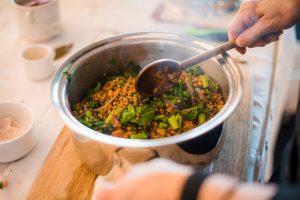As summer transitions to fall and cooler weather sets in, we can make simple lifestyle and diet changes to prepare our bodies for the drop in temperature. For this blog, we turned to Warren Kramer, an internationally recognized macrobiotic counselor, educator, cooking instructor and cruise presenter, for some tips on how to transition into fall with vitality.
“Fall is a time of cleaning out, so to speak, of getting rid of what we do not need,” Kramer says. “As we make ourselves a little more empty we feel more optimistic and hopeful about the future. When the lungs and colon are healthy we experience a nice orderliness in our being, a healthy groundedness, and a nice disposition.”
Fall is the perfect time to support the lungs and large intestine. In Traditional Chinese Medicine, the fall relates to the paired organs of the lungs and large intestine (colon). Issues with these organs will often appear in the fall as that is the time they are going through a kind of cleanse.
Beneficial Fall Foods
When it comes to food, Kramer says that the first step is to start reducing cooling foods such as fruit, juice, raw salads, and frozen desserts. There’s no need to stop eating these foods completely, but Kramer advises consuming them less often to avoid being cold when the cooler weather arrives.
Some of the most beneficial foods to incorporate as we move into fall include: short or medium grain brown rice, millet, root vegetables such as carrot, daikon, parsnip, burdock, and if you can locate it, lotus root. Kramer said that these root veggies truly nourish our “roots,” which are our intestines.
From a macrobiotic point of view, late summer is an important time to harmonize our bodies. Any disharmony in the pancreas (which controls our blood sugar levels), can directly affect our digestion, energy, and overall bodily function. Round vegetables like onions, winter squash (buttercup or butternut), cabbage, turnip and rutabaga are wonderful for supporting blood sugar levels. Cut these vegetables in larger chunks and slow steam them to bring out the sweetness. Emotionally, Kramer says these roots make us feel rooted in our lives, which provides a nice sense of groundedness.
The fall is also the time to increase consumption of lightly cooked leafy greens like kale, collards, and watercress. Besides being great for the liver, leafy greens also support lung health.
Warming Soups

As the temperature drops, soup season kicks in. Kramer shares that there’s nothing quite like a bowl of miso soup to warm the system and support digestion. Miso soup, Kramer says, is like a natural probiotic.
Kramer recommends trying some barley or brown rice miso in a soup. You can also purchase some naturally fermented sauerkraut or pickles and have a small serving once or twice a day with a meal or two as they are fabulous for digestion.
Experiment with using pungent flavors such as mustard, ginger, horseradish, grated daikon, and wasabi. These flavors support the lungs and opens them up.
In addition to these food adjustments, Kramer suggests chewing well, eating sitting down, and avoiding late night eating. Kramer said that these lifestyle habits will dramatically change your health. And, for the fall, Kramer recommends spending plenty of time outside enjoying the cooler weather.
About Warren Kramer
Warren Kramer is an internationally recognized macrobiotic counselor, educator, and cooking instructor. For the past 30 years, he has studied and lived the macrobiotic way of life. Warren teaches the macrobiotic approach to health and wellness, including principles of food selection and preparation, exercise, work and personal relationships.






























